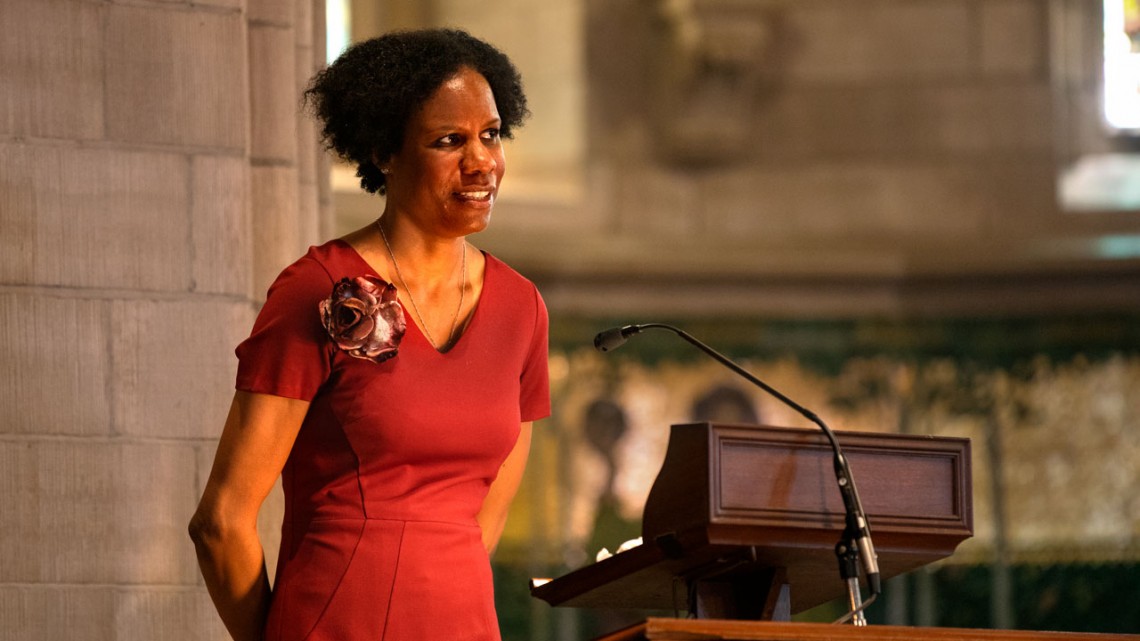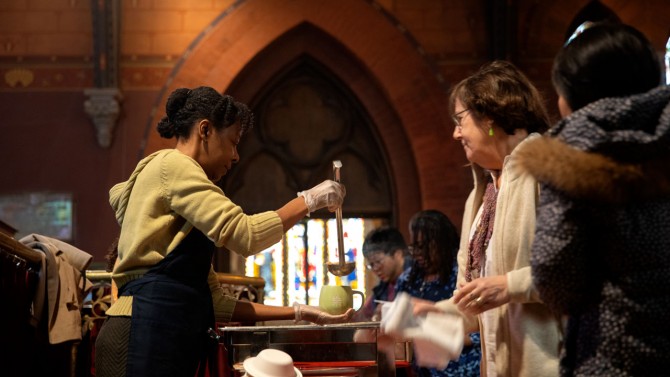
Riché Richardson, associate professor of African-American literature, speaks about her education, her teaching experience and surviving three major surgeries at the most recent Soup and Hope, March 28 in Sage Chapel.
Riché Richardson: from surgery to recovery to hope
By Nancy Doolittle
Over the course of two decades, Riché Richardson, associate professor of African-American literature in Cornell’s Africana Studies and Research Center, received her doctorate and two fellowships, taught at two universities, published numerous essays and a book – and survived three major surgeries.
Those surgeries, and the faith in which she was raised, taught Richardson to live life to the fullest, she said in addressing the latest Soup & Hope gathering, March 28 in Sage Chapel.
Richardson said she spoke to educate others about her condition, to advocate for better health services for women and to affirm the importance of “holding onto hope and never giving up.”
All three of Richardson’s surgeries have been myomectomies to remove uterine fibroids – benign tumors that can seriously compromise health and quality of life, and produce side effects from anemia to infertility. Uterine fibroids affect nearly 80 percent of women, with black women affected disproportionately.
Richardson’s first surgery was in 1998, when she was a doctoral student at Duke University. Her second was in 2008, in the months before leaving her first job in the University of California system and beginning her position at Cornell. Her third surgery – in 2018, after months of trying to live with the fibroids through exercise and homeopathy – was the riskiest and most extensive.
Richardson prepared for the third surgery by scheduling it in Atlanta to be near her family; by having iron infusions weeks in advance; and by getting her finances in order in case “anything went wrong.” Her surgeon removed 74 fibroid tumors; Richardson was administered seven units of blood during and after the procedure.
Other complications after surgery included pain from the surgical incision, low blood pressure, an intestinal blockage and low potassium levels. “I had long days that went by fast to think about my situation,” she said.
Her strength came from what she had learned through her childhood experiences – first in an all-black Catholic elementary school that gave her a “profound sense of peace, happiness, lightness and harmony in the world,” and then as relatives fought battles with various kinds of cancer.
“I have remained hopeful about my own health struggle only because I have learned from those of my loved ones,” Richardson said. “By the time I was 13, I understood the importance of holding onto hope and of never giving up. … Even if an illness limits us, it never defines us.”
Richardson was inspired by her conversations with the hospital’s chaplain and developed “new levels of respect and admiration for those who work in the medical field.” She had time to think about what it meant to be human, to lose connection to civilian clothes, belongings and her cellphone – and to focus on recovery instead.
As she recovered, Richardson also felt grateful she was alive.
“I was ready to live my best life and to pursue my dreams with more passion and determination than ever before,” she said. “The experience deepened my faith and left me feeling even far more spiritual than before, with a deep desire to be a good steward of the life and time I have been left on Earth and to use it to make a difference.”
Today, Richardson lives her life with renewed hope.
“The truly important thing to remember,” she said, “is that every new day that dawns, every new week, every new year, promises possibility and invites us to start anew, to welcome the opportunity for revival, renewal and transformation in our lives, to live them to the fullest and to make the most of them.”
Media Contact
Get Cornell news delivered right to your inbox.
Subscribe

